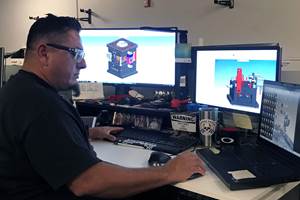How to Compete by Becoming a Learning Organization: Part II
Key attributes of learning organizations can help mold shops develop an effective learning environment.
In the first article of this series, we reviewed the five disciplines of a learning organization: personal mastery, mental models, shared vision, team learning and systems thinking.1,2 Here, the key attributes of learning organizations will be identified—attributes that characterize and facilitate organizational learning and the acquisition of the five disciplines. Organizational learning can be a powerful tool in handling economic downturns and global business challenges being faced today by U.S. molders and moldmakers. By resolving to become learning organizations and developing the same excellence that their customers seek overseas, U.S. mold shops can stay ahead of the competition and develop competitive advantages.
Culture
The most defining attribute of a learning organization is its culture. The culture is a support system for learning, change and improvement. An authoritarian culture, where decisions on what needs to be done are driven by people in authority rather by people with the most knowledge, stifles learning and leads to negative behaviors and tendencies. Following are examples of what might be heard in a company that operates in an authoritarian culture:
- "It's not my job."
- "It's not my or my department's problem."
- "They'll shoot the messenger, I'd better keep quiet."
- "It's a serious problem, but pointing it out will only make everybody mad."
- "They wouldn't listen anyway."
- "Why isn't anyone motivated?"
- "We need to crack the whip more often."
The list could go on; these are merely illustrations. The key to counteracting defeatist rationalizations and thinking patterns is to harness them as learning opportunities rather than interpreting them as cause for criticism or disciplinary action.
Shared Authority
In a mold shop, imposed authority, where decisions are imposed upon people based on authority rather than technical rationale or proficiency, does not work. Authority must be earned from those over whom it is exercised3. It means giving power to those closest to the action.
Learning initiatives are the responsibilities of the individuals or groups within the framework of company support. Nothing motivates learners more than empowering them with the task of designing their own training program, deciding what to learn and how to learn it. Cookie cutter, HR-driven programs rarely yield results, because training is seen as something employees have to do rather than something they choose to do because it is relevant to the problems at hand. In most cases, failure to learn is the fault of the system, not the student.
Courage
Mold shops should not be afraid to challenge their own deep-seated convictions about what is, and need to ask themselves challenging questions. Is China a friend or a foe? Should we abandon a competitive stance toward international moldmaking establishments and instead see them as resources? Is the customer just looking for a machined hunk of metal? Are we interested in the customer's customer, or are we solving the problem for the end user? Does what the customer wants match with what he/she needs?
Occasionally, the best learning is unlearning. Unlearning is driven faster by challenging yesterday's habits, generalizations, solutions, technologies and assumptions. Challenging our deep-seated mental models and organizational habits requires courage.
Physical Environment
The physical design of an mold shop should encourage interaction, communication, social interaction and peer-to-peer learning. Learning can be hampered by inadequate learning and gathering facilities. In most practical or shop-oriented tasks, learning occurs by doing rather than by sitting at a desk or listening to a lecture. Ideally, passive learning, or learning in a classroom or through a lecture, should be balanced with active learning—learning that involves doing and participation. Learning by doing is more powerful than any other form of education or training when implementing solutions, changing processes, developing products, testing concepts and satisfying customers. Active learning, where the learner is personally involved with what is being learned, is considerably more effective than passive class-room learning. This is particularly true when acquiring practical skills such as moldmaking, plastics processing, molding, CAD/CAM or machining.
Innovation and Continuous Improvement
As discussed earlier, learning requires open-mindedness, experimentation and the courage to try new ideas. Mold shops that do this are innovators, constantly experimenting and refining products, services and systems. Contrary to common belief, innovation is rarely the result of sudden insight. Wide-scale innovation takes disciplined effort, constant experimentation and relentless adaptation. In deficient areas, mold shops study failures, constantly adapt and improvise. Continuous improvement is not a project or a short-term goal, but should be a way of life for a shop. Mold shops should focus on incremental improvements such as cost reduction, task-time improvements, downtime reduction and quality enhancements as a matter of routine, without being specifically directed to these assignments by their customers, or worse, by their competitors.
Team Think and Teamwork
Last but not least, learning organizations take a positive role in improvement by exercising curiosity, experimentation, forgiveness, trust and togetherness; a team is more competent, intelligent and able than any individual. Team members complement each other's strengths and compensate for each other's weaknesses. Team members also recognize and understand the system in which they operate and how they can influence it collectively. An organization that has the ability to learn faster than its competition holds an important competitive advantage.
One important area where the five disciplines of learning organizations can be applied to U.S. moldmakers is in overseas market competition. Why have customers gone overseas for molds? Most U.S. moldmakers may believe that it is a decision driven solely by price, but most customers who have purchased molds overseas will content that quality, service, responsiveness and delivery are important considerations as well.
A fired-up team with a unified vision, armed with the magic of systems thinking, can identify what they need to do to maintain and enhance their business. Organizational learning requires answering some uncomfortable questions about the business' current reality and defining what needs to improve in order to survive and thrive. The five disciplines can serve as road map to diagnose and devise strategies for survival. Organizations that fail to learn somehow learn to fail. Learning is not an option; it is a survival strategy.
Footnotes
- Peter M. Senge, The Fifth Discipline: The Art and Practice of The Learning Organization, Currency Doubleday, New York, NY (1990).
- Ashish K. Mithal, Learning to Create Competitive Advantages. Part I: Learning Organizations & Key Disciplines, MoldMaking Technology magazine, October 2004.
- Charles Handy, "Managing the Dream," in Chawla & Renesch's (eds.) Learning Organizations: Developing Cultures for Tomorrow's Workplace, Productivity Press, Inc. Portland, Oregon (1995), pp. 44-55.
Related Content
The Role of Social Media in Manufacturing
Charles Daniels CFO of Wepco Plastics shares insights on the role of social media in manufacturing, how to improve the “business” side of a small mold shop and continually developing culture.
Read MoreEditorial Guidelines: Editorial Advisory Board
The Editorial Advisory Board of MoldMaking Technology is made up of authorities with expertise within their respective business, industry, technology and profession. Their role is to advise on timely issues, trends, advances in the field, offer editorial thought and direction, review and comment on specific articles and generally act as a sounding board and a conscience for the publication.
Read MoreMold Design Review: The Complete Checklist
Gerardo (Jerry) Miranda III, former global tooling manager for Oakley sunglasses, reshares his complete mold design checklist, an essential part of the product time and cost-to-market process.
Read MoreDynamic Tool Corporation – Creating the Team to Move Moldmaking Into the Future
For 40+ years, Dynamic Tool Corp. has offered precision tooling, emphasizing education, mentoring and innovation. The company is committed to excellence, integrity, safety and customer service, as well as inspiring growth and quality in manufacturing.
Read MoreRead Next
Are You a Moldmaker Considering 3D Printing? Consider the 3D Printing Workshop at NPE2024
Presentations will cover 3D printing for mold tooling, material innovation, product development, bridge production and full-scale, high-volume additive manufacturing.
Read MoreReasons to Use Fiber Lasers for Mold Cleaning
Fiber lasers offer a simplicity, speed, control and portability, minimizing mold cleaning risks.
Read More



















